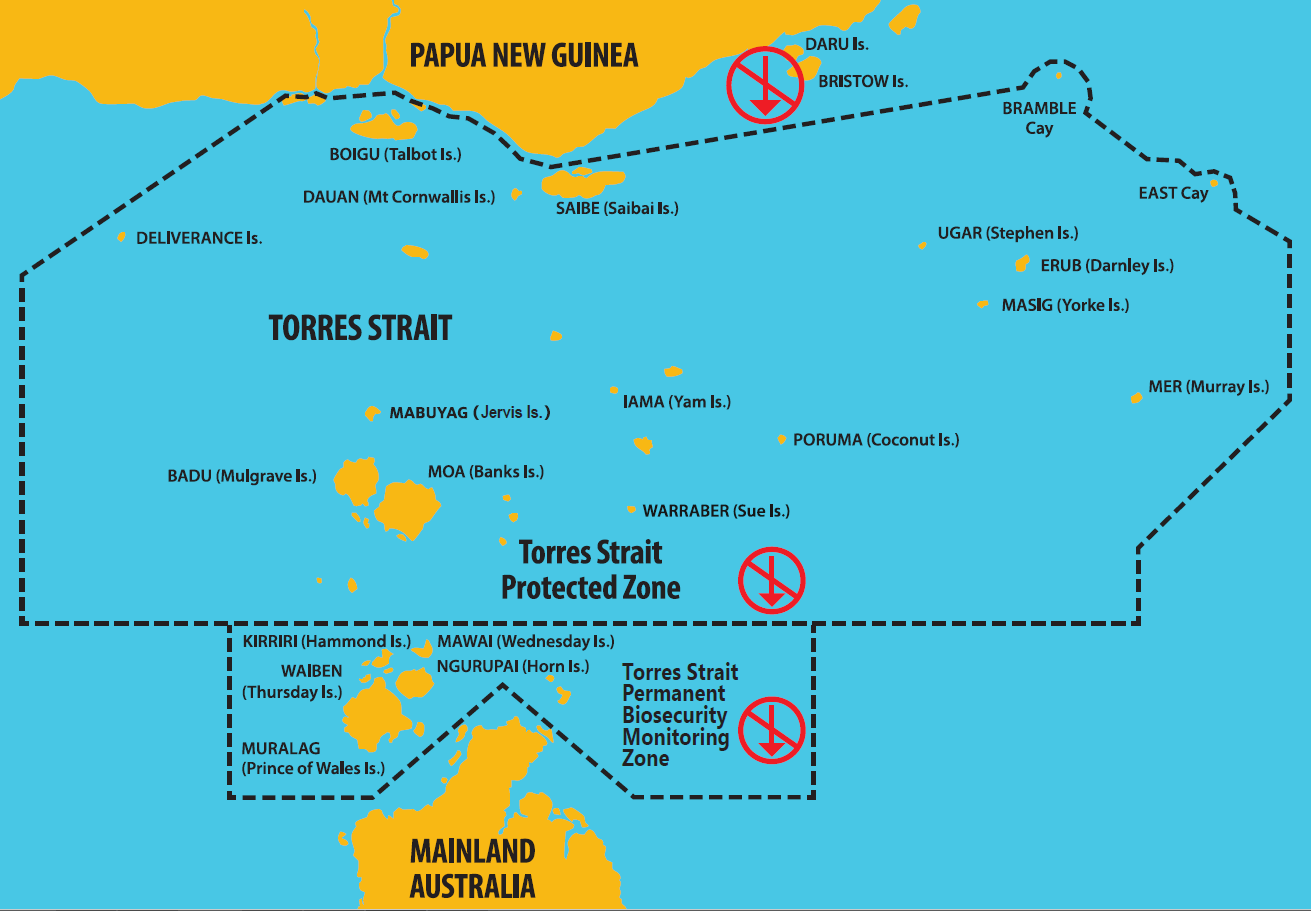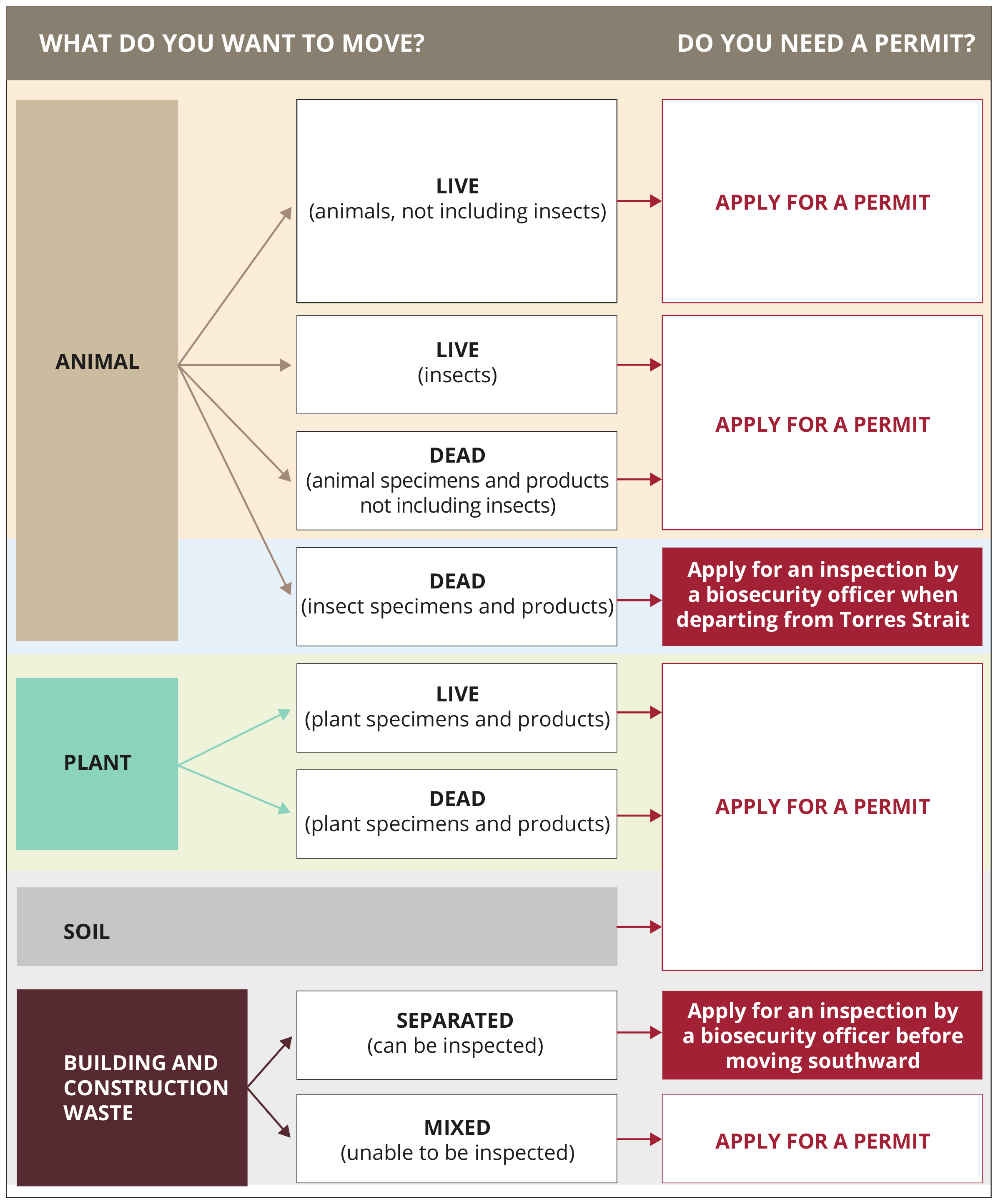The Department of Agriculture, Fisheries and Forestry regulates the movement of goods from the Torres Strait under the Biosecurity Act 2015.
Torres Strait islands are a potential pathway for the movement of exotic pests, weeds and diseases present in countries very close to Australia—the closest Torres Strait Island of Saibai is only 3.6 km from Papua New Guinea (PNG).
Biosecurity in Torres Strait is critically important to the sustainability of the region.
The Torres Strait Treaty 1985 allows traditional movement of people and trade between the 13 PNG treaty villages and the Torres Strait islands within the Protected Zone. The Biosecurity Act 2015 manages the biosecurity risk by applying conditions to the movement of goods.
Traditional vessels and goods from the PNG are exempt from standard pre-arrival reporting and first point of entry requirements when travelling between PNG and the Torres Strait Protected Zone. However, goods and vessels are still inspected to ensure compliance with biosecurity regulations.
Torres Strait has special biosecurity requirements for the southward movement of the following products between the Torres Strait Protected Zone to the Torres Strait Permanent Biosecurity Monitoring Zone, and any Torres Strait islands to mainland Australia. These high risk goods can only be moved if a permit is granted by the Department of Agriculture, Fisheries and Forestry.
- fresh fruit and vegetables
- live animals, including insects
- live plants, including cuttings, seedlings or plant products
- soil
- used machinery and equipment with animal, plant material or soil contamination
- untreated hides or skins or other animal products
- meat or dairy products (excluding canned items)
- poultry products, including eggs or feathers with skin still attached

These goods may only be moved with a permit from us.
Biosecurity laws prohibit the movement of goods subject to import conditions without a permit. We regulate the movement of goods and issue permits when appropriate.

Torres Strait is divided into two zones with particular biosecurity conditions that apply to movement of goods between each zone.
If you are moving items such as personal effects, cargo, shipping containers, machinery or vehicles between the biosecurity zones, or from either biosecurity zone to mainland Australia, you should:
- Ensure your items are free from soil, seeds, plant or animal material.
- Remove potential water reservoirs, including buckets and other containers—these can provide a potential breeding site for mosquitoes that can carry disease.
- Arrange for a biosecurity officer to inspect your goods before departure.
If you are moving sea or air freight it should be presented for inspection to a biosecurity officer before departure to assess for potential biosecurity risks such as insect pests.
To check if a biosecurity officer is available contact your local office or the Thursday Island office on 07 4212 0185.
If a Biosecurity Officer is not available in Torres Strait before your goods depart, you can apply for a Biosecurity Approval Notice (BAN) On Line. The BAN application should be lodged 3 working days before departure.
This form will allow a Biosecurity Officer to assess the risk of your cargo and determine further actions at the final destination. You should make note of the further actions on the BAN form.
Biosecurity Approval Notice form
A BAN cannot be used to move live animals, soil or plants instead you must apply for a permit in the section below.
If you require further information about moving goods within the zones or from the Torres Strait, or there is no officer available at the point of departure, contact the Thursday Island office on 07 4212 0185.
Office: Thursday Island, Torres Strait
Email: Thursday Island
Biosecurity laws and regulations apply to ALL vessels and individuals carrying goods subject to import conditions, no matter what form of transport they use.
For more information on the requirements for vessels over seven metres travelling from Torres Strait to the Australian mainland visit Shipping and yachting in Torres Strait.
For more information on the requirements for aircrafts travelling from Torres Strait to the Australian mainland visit aircraft arriving on mainland Australia from the Torres Strait
What do you want to move?
Cats and dogs require a permit to move between the Torres Strait Protected Zone to the Torres Strait permanent biosecurity monitoring zone and from either of these zones to mainland Australia.
The owner of the cat or dog must:
- complete and submit an application for permit to move goods online and lodged 7 days prior to departure. When applying for a permit, the owner must provide details of the animal’s origin and health
- treat the dog/cat prior to inspection with a registered product effective against fleas and ticks (both paralysis ticks and brown dog ticks) as per the manufacturer’s label. You will need to provide evidence of the use of this product such as a receipt, product packaging or a letter from your veterinarian
- arrange an appointment for the dog/cat to be inspected by a biosecurity officer on the island of departure within 5 days of departure.
All live animals, except live fish, require a permit to move between the Torres Strait Protected Zone to the Torres Strait permanent biosecurity monitoring zone and from either of these zones to mainland Australia.
The owner of an animal (such as birds, reptiles, guinea pigs), should:
- complete and submit an application for permit to move goods online and lodged 7 days prior to departure
- follow the conditions on the permit
- arrange an appointment for the animal to be inspected by a biosecurity officer on the island of departure within 5 days of departure.
Live fish do not require a movement permit but, prior to movement, both the fish and any packaging must be inspected by a biosecurity officer for biosecurity risk material (such as plant material).
Note: this does not apply to live fish from PNG. For live fish from PNG refer to the Biosecurity Import Conditions system (BICON).
The southward movement of live insects (including viable insect products) from the Torres Strait Protected Zone to the Torres Strait permanent biosecurity monitoring zone or from either of these zones to mainland Australia is restricted (that is prohibited without a permit). A permit to move goods may be issued on a case by case basis if the biosecurity risk(s) can be appropriately managed.
An application for permit to move goods must be completed and lodged at least 7 days prior to departure.
The southward movement of all animals and animal products from the Torres Strait Protected Zone to the Torres Strait permanent biosecurity monitoring zone or from either of these zones to mainland Australia is restricted (that is prohibited without a permit). This restriction applies to scientific specimens and any material of animal origin. Some goods may be moved without a permit, as long as they are presented for inspection by a biosecurity officer prior to movement and are clean and free of other biosecurity risk material.
An application for permit to move goods may be completed online and lodged 7 days prior to departure.
The southward movement of dead insects from the Torres Strait Protected Zone to the Torres Strait Permanent Biosecurity Monitoring Zone or from either of these zones to mainland Australia is restricted (that is prohibited without a permit). A permit to move goods may be issued on a case-by-case basis if the biosecurity risk(s) can be appropriately managed.
An application for permit to move goods must be completed and lodged at least 7 days prior to departure.
The southward movement of plant material from the Torres Strait Protected Zone to the Torres Strait Permanent Biosecurity Monitoring Zone, or from either zone to mainland Australia, requires a permit. A permit to move live plants will only be issued if the biosecurity risk can be appropriately managed.
An application for permit to move goods (such as plant, animal and soil products) from Torres Strait may be completed online and lodged 7 days prior to departure
The southward movement of dead plants and herbarium material from the Torres Strait Protected Zone to the Torres Strait permanent biosecurity monitoring zone or from either of these zones to mainland Australia requires a permit and, where possible, treatment in Torres Strait prior to movement.
An application for permit to move goods (such as plant, animal and soil products) from Torres Strait must be completed and lodged at least 7 days prior to departure.
The removal of soil from the Torres Strait Protected Zone to the Torres Strait permanent biosecurity monitoring zone or from either of those zones to mainland Australia is restricted (that is prohibited without a permit). Soil samples that have been granted a permit can only be moved to a Torres Strait Approved Treatment Facility; for example soil laboratory.
An application for permit to move goods (such as plant, animal and soil products) from Torres Strait may be completed online and lodged 7 days prior to departure.
All approved permits for soil samples are for one consignment only.
The removal of building and construction waste from the Torres Strait Protected Zone to the Torres Strait Permanent Biosecurity Zone or any Torres Strait Island to the mainland requires a permit.
Building and construction waste is subject to inspection prior to movement and conditions (legally enforceable) will be specified on the permit depending on the level of biosecurity risk.
Conditions will include requirements relating to the following:
- pre-movement treatments
- containment of receptacles
- treatment requirements upon arrival at mainland point of entry
- transport and disposal (via an approved process such as deep burial).
An application for permit to move goods (such as building and construction waste) from Torres Strait may be completed online and lodged 7 days prior to departure.
Biosecurity requirements for removing commercial and construction waste from Torres Strait (PDF 3.4 MB)
Biosecurity requirements for removing commercial and construction waste from Torres Strait (DOCX 75 KB)
On 1 July 2016, new Queensland Biosecurity legislation came into force. These new laws under the Queensland Biosecurity Act 2014 include a “general biosecurity obligation.” This means that you are responsible for managing biosecurity risks that are under your control, that you know about or should be reasonably expected to know about. You must take all practical steps to avoid moving something that could carry a pest, disease or contaminant (e.g. animals, plants, soil, equipment) moving north or south.
Further information
Permit applications are completed online. If you have any questions please contact our Thursday Island office or the Cairns office on the details listed below.
Office: Thursday Island, Torres Strait
Email: Thursday Island
Phone: 07 4212 0185
Office: Cairns
Email: NAQS
Phone: 07 4241 7800

